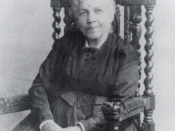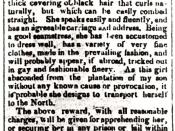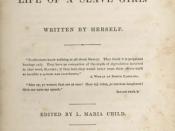The world, today, is teeming with techniques and methodologies developed for the sole purpose of measurement and evaluation. It is a daily activity for scholars and average JoeÃÂs, alike, to assign rank to items and ideas. Many entities have legitimate, effective, and efficient means to assign rank in a consistent and unbiased manner. This is ideal. However, there frequently comes times when the doling out of superlative position is nothing more than the ordering of opinions. This is certainly the case when comparing the slave narratives of siblings, Harriet and John S. Jacobs. Upon initial observation of the texts the reader will notice that there is a clear distinction between the two; length. The narrative of and by Harriet Jacobs, Incidents in the Life of a Slave Girl, is much longer than John S. JacobsÃÂ, ÃÂA True Tale of Slavery.ÃÂ What does this mean? Perhaps, it goes to show that the feminine account is a more accurate report of events, for more length must surely mean more facts and details.
Maybe the difference in length is a testament to the overall quality of the narratives. Maybe Harriet Jacobs was just consumed with a fervor unmatched by her brother and this allowed her to deliver a longer, more heartfelt product. The verity of the matter is that such claims are completely relative; no pun intended. Among readers who have experienced both narratives there exists the misconception that brevity equates to a lack of passion. This claim is nonsensical and a sign of complete irreverence to the cause of John S. Jacobs, and consequently, every other slave narrator, published or otherwise. A sensible comparative analyst knows that the difference in length between the narratives is just that, a difference, and nothing more. Harriet and John S. Jacobs are two different people.


